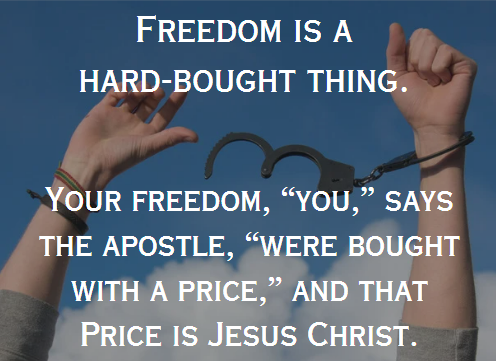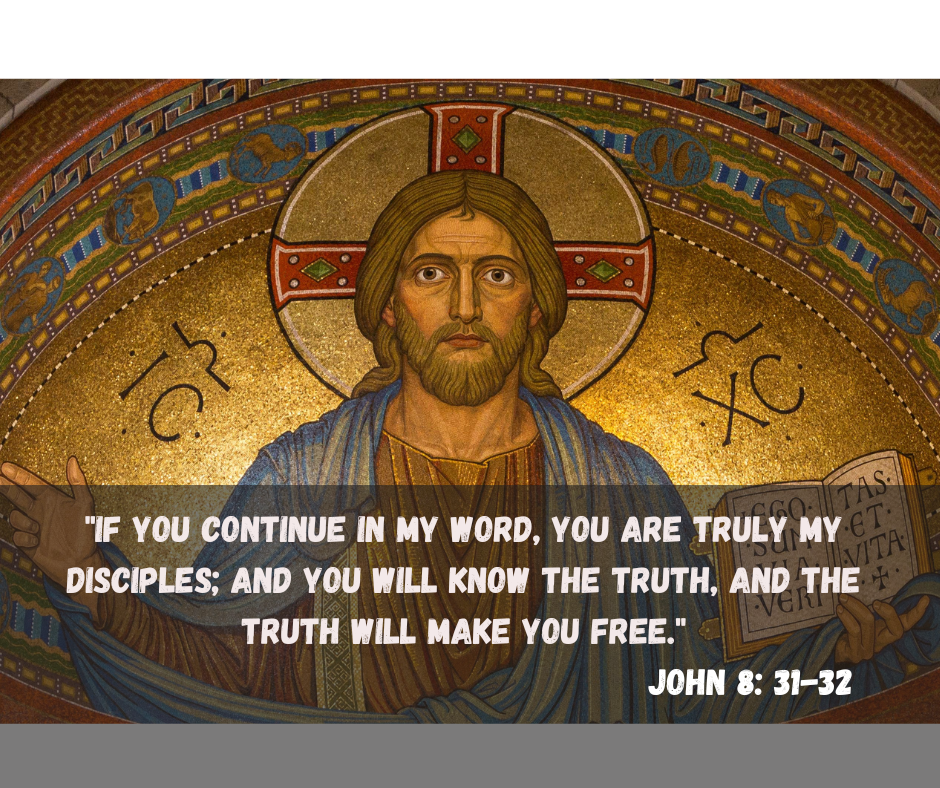Co-missioners,
Here is the second half of Robert Bertram’s 1968 commencement address at Concordia Senior College.
Back then, had Bob already tumbled to the terminology of Diagnosis and Prognosis that he would later bequeath to Crossings? If not, he was certainly practicing what the terms describe. Last week you got an expert’s diagnosis of the way freedom traps us all in God’s accusing judgment. Today you get a prognostic description of how God acts in Christ to spring us from that trap.
There are two ways of reading this address in 2023. One is devotional, the other didactic. The first is easily the more important of the two. God is still talking to us through his sainted servant, Bob, with a message to hear, trust, and exult in as we put it to use this year. God gladden your hearts as you read!
Meanwhile, notice how Bob the consummate teacher is still teaching the rest of us how to locate the Gospel in the gritty dust of Golgotha. Those familiar with the six-step Crossings Method will find the last three steps on vivid display today. (For the first three steps see last week’s post.)
Finally: if you’re one of those Lutherans who insist on observing Reformation Sunday at the end of October, we encourage you to keep this post handy. We can’t think of a better exposition of the day’s great text: “If you continue in my word…you will know the truth, and the truth will set you free.” And again, “If the Son makes you free, you will be free indeed.”
Amen and amen, as Bob prompts us to say.
Peace and Joy,
The Crossings Community
___________________________________________________
The Twice Free Student—or Citizen
(continued from Part One)
by Robert W. Bertram
Recapping from last week—
There is freedom and there is freedom. There is freedom with a small f and freedom with a capital F. Both freedoms are yours. You are twice free. Of both freedoms we can say, though not in the same way, three things: freedom is a hard-bought thing, freedom is a responsibility, freedom is a mirror.
Again—
We have no right to run away from our freedom, as mortifying as it finally is…. We have no right not to be free, no right to evade that ultimate exposure. From that dilemma there is no buying our own way out. That, alas, is freedom with a small f.
+ + +
II. Freedom, Capital “F”
But there is also freedom with a capital F. You are twice free. So now let us say it all over again quickly another way—that Way which is Jesus our Lord.
Freedom is a hard-bought thing. Your freedom, “you,” says the apostle, “were bought with a price,” and that Price is Jesus Christ. You were “purchased with His own blood.” To rescue us from exile in the far country of our sin and our rejectedness, he left behind the beloved country, the family circle of the heavenly Father, having counted in advance the cost of bloodshed and parental rejection, and he suffered our forsakenness. He cried our cry, “My God, My God, why have you forsaken me?” But for this price, which he did not begrudge, we are free to return, beyond the forsakenness to the forgiveness of the waiting Father. This “Freedom Fighter,” Jesus Christ, fought for us with stick and stone—a stick of a cross and a stone rolled from a tomb. But though he lost his life, it was no losing battle. He bought for us our freedom.
Freedom is a hard-bought thing. But because it has been bought the hard way by Jesus our Lord, you won’t need to buy your own freedom that way, also not your academic freedom. I don’t mean by that that those students who are Christians and have been liberated by Christ ought therefore to get their academic freedom cheap, at some sort of clergy discount. Our Lord did not die for us to be goof-offs. Christian freedom is not permissiveness and coddling. Church membership does not exempt students from doing their homework or from taking the consequences when they slip. If anything, it liberates them to take the consequences with good courage.
But that isn’t all that our Lord’s hard-bought liberation liberates us for, namely, for the courage to face the music of our own failings. Oh, no. It also liberates us from failing in the first place. It really does, as those of you who believe that have discovered. Take the threat out of freedom, and those who otherwise would dread that freedom might now instead be glad to try their hand at it, be glad to live up to it, be glad to take on one new freedom after the other.
When you take the threat out of freedom the way our Lord has done, by his taking our threat unto himself, it does not follow that his beneficiaries will necessarily abuse their new freedom. They might. That is a risk. But they might also take their new freedom in stride, and prove in the process that they can handle it. If so, they are then free not merely to accept their F’s like men, with stiff upper-lip, but more than that: free to expect excellence of themselves and actually to enjoy it. Don’t be surprised when students with that kind of confidence—confidence in the hard-bought freedom Christ won for them—appear at the dean’s office one morning with a request for some bold new student freedom. They might just have rather impressive backing.
+ + +
Freedom, we said, is our responsibility. Let us say now, “Our freedom is Christ’s responsibility.” For liberating us, who were not only bound but guilty, he took the blame. If I walked into the Allen County jail and took it upon myself to turn the prisoners loose, I of course would be held responsible for this audacious interference. Christ in his audacious mercy walked into our off-limits world and took it upon himself, the Holy One of God, to fraternize with us, the enemy, and to set us free. For this he bore the responsibility, bore it all the way to the death, bore it away.
Our freedom is Christ’s responsibility. Because it is, we in turn are free to be responsible for every other weary slave. No one who enjoys the liberty of Christ sits idly by, irresponsibly observing the slavery of others. Christ’s church is no observatory, no womb-with-a-window. Wherever men are bound, in whatever ghetto—whether in the inner city or perhaps on our own campus—whether east of the Iron Curtain or west of it; wherever people are silenced by bigotry, the cruel bigotry of militant prejudice or of bleeding-heart sentimentality or of quietistic silence; wherever people are terrorized, whether by starvation and rats, by napalm, by a mushroom cloud, by cancer, by the truth about themselves—there is the church’s urgent and happy responsibility: to cheer them on to their freedom, or to love them into their freedom, or to spend oneself for their freedom.
Our freedom is Christ’s responsibility. Because it is, you too are free to be responsible for one another—for one another as students, as scholars and learners. You need not restrict that responsibility to your fellow-student’s courtship problems or to his emotional problems, to his (as we say) “personal” problems. Even with such prosaic problems as the boredom he suffers in course number so-and-so or the fatalism he brings to tomorrow’s exams you are now free to help shoulder his burden. “He’s not heavy, Father, he’s my brother.” No longer need you say, about his disinterest in history or science or his aversion to ideas, that is none of your business. He is your business, as you are Christ’s. That, thank the Lord, is how free you now are. Only a few weeks ago a student told me he would never have gotten so wrapped up in his term paper if it hadn’t been for the interest shown in it by an upperclassman across the hall. For the freedom of one another you are now free to be responsible.
+ + +
Freedom is a mirror. It may be an accusing mirror, reflecting our unworthiness of it. This freedom scares us off. But now Christ steps before the mirror, between it and us. He makes the mirror reflect not us but himself as our Go-between. Now we are free from the way we used to look, free to look like him. Gone are the old wrinkles of discouragement, the shadow-lines of guilt, the slouch of defeat. Instead the mirror, the divine evaluation, shows us looking quite as good and alive as Jesus himself. He, the New Testament says, is the very likeness of the Father, the express image of the Godhead. We had been orphaned from that Father, and we looked it. But now our Father, seeing us as Christ, exclaims, “My, how you resemble me, how much you look like my own darling youngsters—the very spit and image of your Father.” This new look is the “glorious liberty of the children of God.”
Freedom is a mirror. In the Father’s eyes we have the look of Christ about us. But not only in our Father’s eyes. Also in the eyes of one another. As more and more we associate with Christ—as in the church’s preaching we listen not for the preacher but for Christ, as in the company of one another we divine the companionship of Christ—so more and more he begins to grow on us. You have known some happily married couple who through their life together have come to think alike, talk alike, and even look alike. So it can be with us and our Husband, Christ. I say this not only to those of you who already have learned to enjoy this happy union with him but to those of you as well who are trying to make it alone. The freedom of being independent is nothing like the freedom of being mated with him. And it shows. One of you, seated here this afternoon, once said to me: A saint is a person who makes it a little easier to believe in God. You not only said that to me. You showed it to me, you and your wife, to my own eyes.
As you, my students—and that, poor you, is what you will soon literally be: my students—as you grow to think and love with “the mind of Christ,” and thrive on His Spirit, there is no hard-nosed professor tough enough to intimidate you, no seminary that can contain you, no system—synodical or otherwise—that can restrict you, no accusing mirror that can embitter or depress you, at least not unto death. Whatever oppressors you may encounter had better watch out for you, for what they will see in you—and they jolly well may recognize him—is the liberating Christ. They had better watch out, for you may just captivate them as he did you, by loving them and helping them to live. There, in the Christ whom you can mirror, is the freedom for this world, and not for this world alone.
Thursday Theology: that the benefits of Christ be put to use
A publication of the Crossings Community





You must be logged in to post a comment.